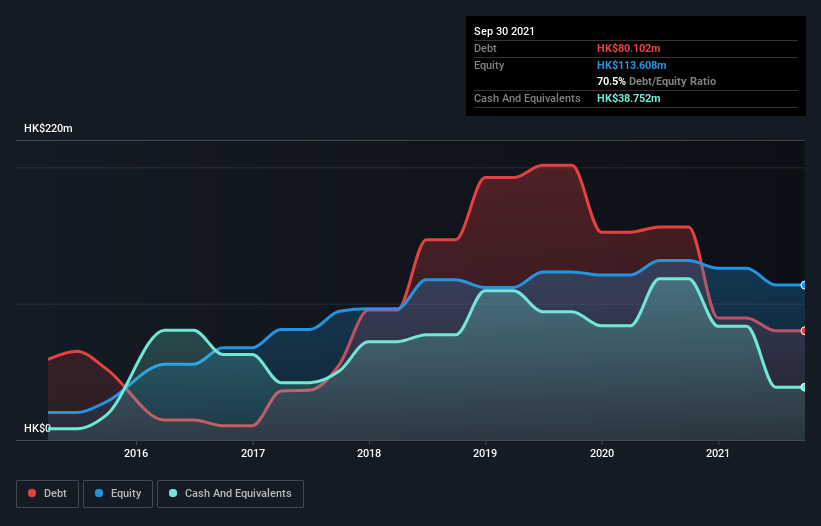
Legendary fund manager Li Lu (who Charlie Munger backed) once said, 'The biggest investment risk is not the volatility of prices, but whether you will suffer a permanent loss of capital.' It's only natural to consider a company's balance sheet when you examine how risky it is, since debt is often involved when a business collapses. We note that Ching Lee Holdings Limited (HKG:3728) does have debt on its balance sheet. But the real question is whether this debt is making the company risky.
When Is Debt A Problem?
Debt is a tool to help businesses grow, but if a business is incapable of paying off its lenders, then it exists at their mercy. In the worst case scenario, a company can go bankrupt if it cannot pay its creditors. However, a more common (but still painful) scenario is that it has to raise new equity capital at a low price, thus permanently diluting shareholders. Having said that, the most common situation is where a company manages its debt reasonably well - and to its own advantage. When we think about a company's use of debt, we first look at cash and debt together.
View our latest analysis for Ching Lee Holdings
How Much Debt Does Ching Lee Holdings Carry?
The image below, which you can click on for greater detail, shows that Ching Lee Holdings had debt of HK$80.1m at the end of September 2021, a reduction from HK$156.2m over a year. However, it also had HK$38.8m in cash, and so its net debt is HK$41.4m.

How Healthy Is Ching Lee Holdings' Balance Sheet?
The latest balance sheet data shows that Ching Lee Holdings had liabilities of HK$288.2m due within a year, and liabilities of HK$1.80m falling due after that. Offsetting these obligations, it had cash of HK$38.8m as well as receivables valued at HK$279.4m due within 12 months. So it can boast HK$28.1m more liquid assets than total liabilities.
It's good to see that Ching Lee Holdings has plenty of liquidity on its balance sheet, suggesting conservative management of liabilities. Due to its strong net asset position, it is not likely to face issues with its lenders. The balance sheet is clearly the area to focus on when you are analysing debt. But you can't view debt in total isolation; since Ching Lee Holdings will need earnings to service that debt. So if you're keen to discover more about its earnings, it might be worth checking out this graph of its long term earnings trend.
Over 12 months, Ching Lee Holdings made a loss at the EBIT level, and saw its revenue drop to HK$736m, which is a fall of 32%. To be frank that doesn't bode well.
Caveat Emptor
While Ching Lee Holdings's falling revenue is about as heartwarming as a wet blanket, arguably its earnings before interest and tax (EBIT) loss is even less appealing. To be specific the EBIT loss came in at HK$12m. On a more positive note, the company does have liquid assets, so it has a bit of time to improve its operations before the debt becomes an acute problem. But a profit would do more to inspire us to research the business more closely. So it seems too risky for our taste. There's no doubt that we learn most about debt from the balance sheet. However, not all investment risk resides within the balance sheet - far from it. To that end, you should learn about the 2 warning signs we've spotted with Ching Lee Holdings (including 1 which doesn't sit too well with us) .
When all is said and done, sometimes its easier to focus on companies that don't even need debt. Readers can access a list of growth stocks with zero net debt 100% free, right now.
New: AI Stock Screener & Alerts
Our new AI Stock Screener scans the market every day to uncover opportunities.
• Dividend Powerhouses (3%+ Yield)
• Undervalued Small Caps with Insider Buying
• High growth Tech and AI Companies
Or build your own from over 50 metrics.
Have feedback on this article? Concerned about the content? Get in touch with us directly. Alternatively, email editorial-team (at) simplywallst.com.
This article by Simply Wall St is general in nature. We provide commentary based on historical data and analyst forecasts only using an unbiased methodology and our articles are not intended to be financial advice. It does not constitute a recommendation to buy or sell any stock, and does not take account of your objectives, or your financial situation. We aim to bring you long-term focused analysis driven by fundamental data. Note that our analysis may not factor in the latest price-sensitive company announcements or qualitative material. Simply Wall St has no position in any stocks mentioned.
About SEHK:3728
Ching Lee Holdings
An investment holding company, engages in the provision of construction, consultancy, and project management services primarily in Hong Kong.
Mediocre balance sheet and slightly overvalued.
Market Insights
Community Narratives



